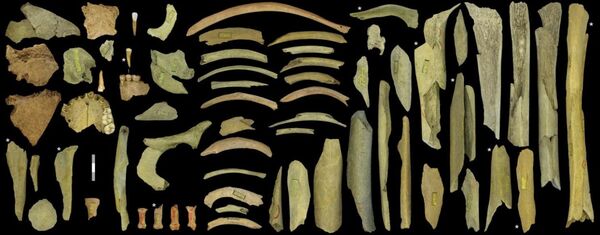An international team of researchers has determined that our distant Neanderthal ancestors had a fish and seafood diet as early as 80,000 years ago and enjoyed the increased cognitive powers that have hitherto been attributed solely to Homo sapiens, according to a new study published in the journal Science by the lead author, Professor João Zilhão from the University of Barcelona .
The conclusion was made after Dr Dirk Hoffmann's team at the Göttingen Isotope Geology Department dated so-called “flowstone layers", which look like stalagmite masses and are formed by calcite deposits caused by dripping water. The formations were found to date back to between “86,000 and 106,000 years old”, the period when Neanderthals began settling in Europe. The analysis method used is known as “uranium-thorium" or “thorium-230 dating”, a radiometric dating technique that has been used for the past several decades to determing the age of calcium carbonate sediments during excavation work.
The aforementioned verified evidence about Neanderthals eating seafood was found in a cave known as Figueira Brava in Portugal, located 30 kilometres (18.6 miles) south of Lisbon on the slopes of the Serra da Arrábida. The place, incidentally, was found to have been located right on the coastline thousands of years ago, which made it possible for ancient people, including Neanderthals, to “routinely harvest” ancient mussels and other crustaceans, fish, waterfowl and marine mammals, such as dolphins and seals.
It follows from research that if the regular consumption of marine life, rich in super nutritious Omega-3 fatty acids, plays an important role in the development of cognitive abilities, then this applies not only to the long-established cognitive species of Homo sapiens, but likewise to Neanderthal populations.
Put another way, “if this common consumption of marine resources played an important role in the development of cognitive skills, it did so on the entire humanity, including Neanderthals, and not only the African population that spread later", said Dr Zilhão.
The new evidence thus proved that Neanderthals could have already boasted increased cognitive ability, which could have boosted their ability for abstract and artistic thinking - something that effectively underpins earlier excavation findings that date back to over 80,000 years ago.

Decorated seashells, rock art, and cave paintings were discovered in as many as three caves on the Iberian Peninsula in Spain dating to 65,000 years ago by the same research team. Separately, it was earlier reported that Neanderthals suffered from so-called “surfer’s ear” and probably even dived to collect shells to further use them in their crafts.

